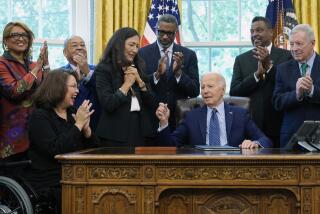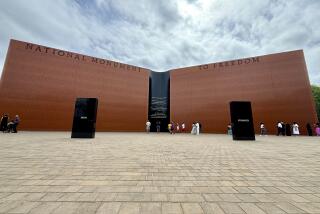PERSPECTIVE ON SLAVERY : Acknowledging a Terrible Sacrifice : In a nation that commemorates defining aspects of its history, why have the people it subjugated been left out?
- Share via
When slavery was abolished in 1865, our nation’s leaders made a feeble gesture of recompense by promising each freed slave 40 acres of land and one mule to work it. The government never kept that promise or provided any other formal economic aid to former slaves.
The economic advantages that this land derived during three centuries of free agricultural and industrial labor from millions of enslaved human beings are incalculable. At the time of the Emancipation Proclamation, more than 10 million disenfranchised black Americans were turned out of slavery--disoriented, stripped of their African identity, and by then so mixed with American Indian and European bloods as to be literally a new “native American.”
Perhaps the most telling evidence of the American denial of slavery is the conspicuous absence of a national memorial to the millions of enslaved African Americans who lived and died in bondage up to and beyond the signing of the Emancipation Proclamation. In a nation that commemorates defining aspects of its history with memorials, none has been raised to the helotry of a historically subjugated people whose ancestors were forcibly brought from Africa to the Americas, who were forcibly held in slave labor to build the early foundations of this country and who died by the millions en route to or on these shores. Many Americans of all races find it unconscionable that we have never established a national memorial for black American slaves.
But what symbol best drills the essence of the African American slave experience? Some European Americans have suggested that the Lincoln Memorial is the unofficial American slavery memorial. However, while Abraham Lincoln’s opposition to slavery was pivotal, the Lincoln Memorial honors the insightful President who kept our nation united as it grudgingly evolved from a slave economy to an industrialized and more civilized nation. Some African Americans have suggested that an African tribal symbol or family statue be placed at some official site in Washington, D.C. But which tribal nation or symbol? Black Americans come from numerous African peoples, ranging from Gambia to Angola.
Testimony from Africans and African Americans of the diaspora, from Canada to Argentina, suggests that the most enduring image of the trauma of slavery is the voyage to the Americas. All enslaved Africans shipped to the Americas shared this most terrifying aspect of the slave experience. While the overwhelming majority of American ancestors of all races arrived by ship, only one group arrived chained to the planks. This fact alone makes the origins of the African American unique.
For the enslaved Africans, the voyage of this “middle passage” was like a journey through Dante’s Inferno--a one-way trip to a realm as utterly alien as it was unimaginably horrid. One day, they were living as free villagers in a land they had inhabited for thousands of years; the next, they were in chains and being forced into the hold of a strange vessel, never to return to their families. On board, they experienced what can only be described as hell.
Contemporary accounts by European ship captains and other officials inspire horror and revulsion. “They were literally piled one on top of another and the unsteady motion of the ship, combined with foul air and great heat made the place simply horrible,” writes one captain. “The floor of the hold was so covered with blood and mucus which proceeded from them in consequence of the flux, that it resembled a slaughter house. . . . Sometimes a dead and living Negro (were) fastened by their irons together . . . (T)he living Negro was disengaged and the dead one thrown overboard . . . It is not in the power of the human imagination to picture a situation more dreadful or disgusting.” Nothing better symbolizes American slavery than the lower decks of the slave ship.
The time has come for the leaders of this nation to erect an American Slavery Memorial on the Mall in our nation’s capital. It should be a memorial of commanding proportions, presence and dignity that will remind all Americans--especially African Americans--of our nation’s commitment to racial justice, fairness and equality. Fair-minded citizens throughout the land would support the erection of such a memorial as an enduring symbol of national appreciation for the contributions of the millions of African American slaves and their progeny to the United States. Throughout the Americas, descendants of slaves could point to this tangible symbol with the satisfaction of knowing that a great nation has finally and eloquently acknowledged a great and terrible sacrifice.
More to Read
Sign up for Essential California
The most important California stories and recommendations in your inbox every morning.
You may occasionally receive promotional content from the Los Angeles Times.










